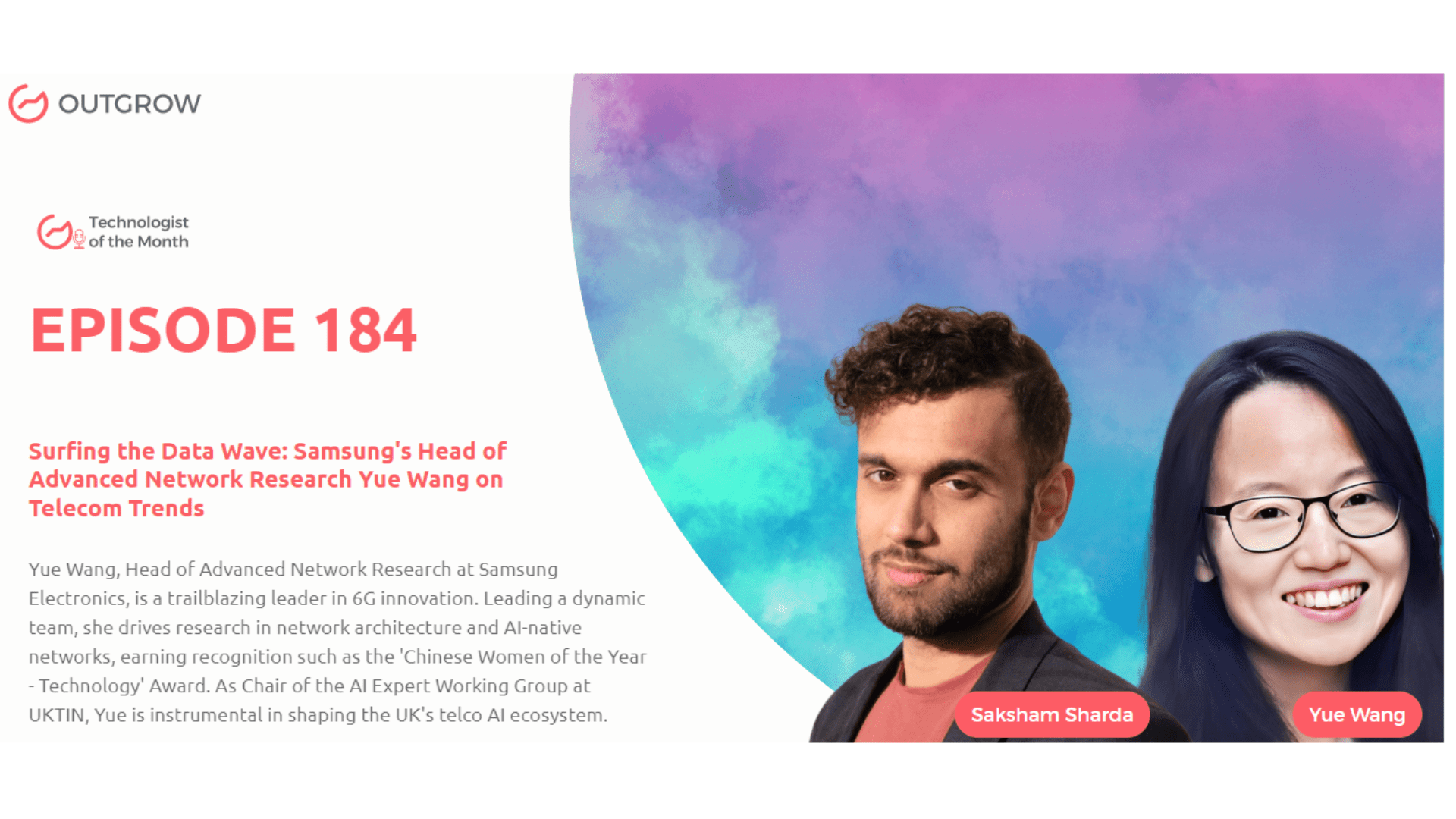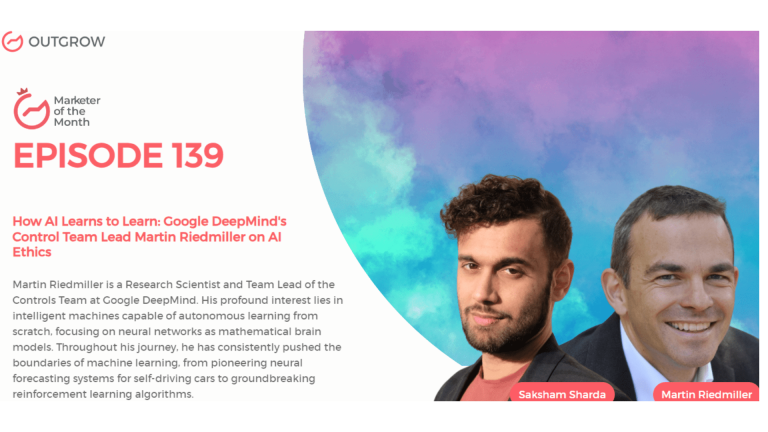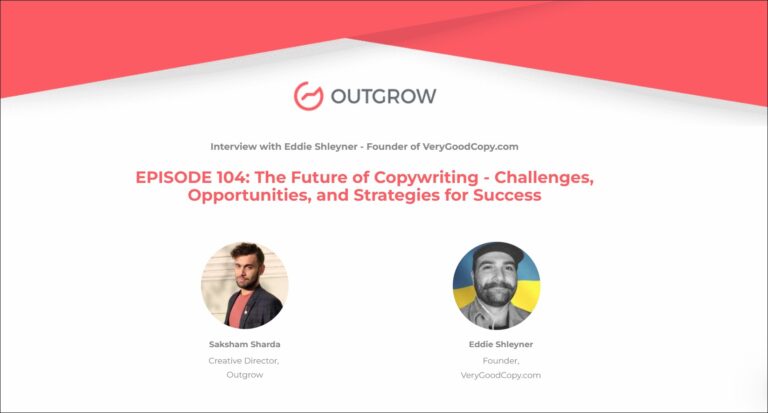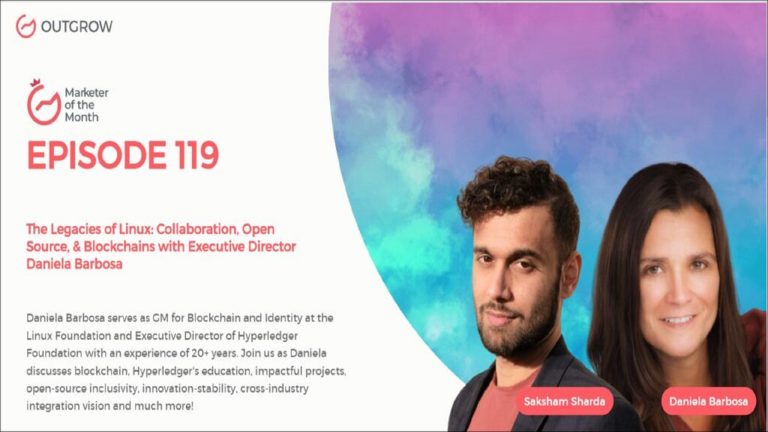EPISODE 184: Marketer of the Month Podcast with Yue Wang
Table of Contents
Hey there! Welcome to the Marketer Of The Month blog!
We recently interviewed Yue Wang for our monthly podcast – ‘Marketer of the Month’! We had some amazing insightful conversations with Yue and here’s what we discussed about –
1. AI as the foundation for telecom transformation, reducing costs and expanding revenue streams.
2. Balancing risk-taking with ROI justification and staying ahead of emerging tech.
3. Identifying opportunities and recommending unified frameworks for AI in telecom.
4. Diverse and inclusive environments are crucial for team morale and creativity.
5. Symbiotic Relationship: AI and Connectivity for efficient collaboration and data sharing.
6. Progress in deploying AI solutions for computational resources.
About our host:
Dr. Saksham Sharda is the Chief Information Officer at Outgrow.co. He specializes in data collection, analysis, filtering, and transfer by means of widgets and applets. Interactive, cultural, and trending widgets designed by him have been featured on TrendHunter, Alibaba, ProductHunt, New York Marketing Association, FactoryBerlin, Digimarcon Silicon Valley, and at The European Affiliate Summit.
About our guest:
Yue Wang, Head of Advanced Network Research at Samsung Electronics, is a trailblazing leader in 6G innovation. Leading a dynamic team, she drives research in network architecture and AI-native networks, earning recognition such as the ‘Chinese Women of the Year – Technology’ Award. As Chair of the AI Expert Working Group at UKTIN, Yue is instrumental in shaping the UK’s telco AI ecosystem.
EPISODE 184: Surfing the Data Wave: Samsung’s Head of Advanced Network Research Yue Wang on Telecom Trends
The Intro!
Saksham Sharda: Hi, everyone. Welcome to another episode of Outgrow’s Marketer of the Month. I’m your host, Dr. Saksham Sharda, and I’m the creative director at Outgrow. co. And for this month we are going to interview Yue Wang, Head of Advanced Network Research at Samsung Electronics.
Yue Wang: Great to be here. Thank you.
Don’t have time to read? No problem, just watch the Podcast!
Or you can just listen to it on Spotify!
The Rapid Fire Round!
Saksham Sharda: At what age do you want to retire?
Yue Wang: Pass.
Saksham Sharda: How long does it take you to get ready in the mornings?
Yue Wang: 30 minutes.
Saksham Sharda:: Favorite color?
Yue Wang: Blue.
Saksham Sharda: What time of day are you most inspired?
Yue Wang: Seven to eight in the morning.
Saksham Sharda: How many hours of sleep can you survive on?
Yue Wang: Five.
Saksham Sharda: Fill in the blank. An upcoming technology trend is ______.
Yue Wang:: AI native networks.
Saksham Sharda: how do you relax?
Yue Wang: Read.
Saksham Sharda: How many cups of coffee do you drink per day?
Yue Wang: I don’t drink coffee.
Saksham Sharda: A habit of yours that you hate.
Yue Wang: Not doing any exercise.
Saksham Sharda: The most valuable skill you’ve learned in life
Yue Wang: Pass.
Saksham Sharda: One-word description of your leadership style.
Yue Wang: Nurturing.
Saksham Sharda: Ideal vacation spot for relaxation.
Yue Wang: Islands.
Saksham Sharda: Key factor for maintaining a work-life balance.
Yue Wang: Pass.
The Big Questions!
Saksham Sharda: Alright, so that’s the end of the rapid fire. Okay. Now we can go on to bigger, bigger questions. The first one is to tell me about your role as a head of advanced network research at Samsung Research UK.
Yue Wang: Yeah, right. So I’m the head of advanced Network research at Samsung Research UK. Here I lead a team of really talented researchers working on cutting-edge technologies for beyond 5G and 60 G networks. So having said it’s beyond 5G and 6G, we do also have a flavor of near-term research that looks into the immediate impact on the standards and into the product. And for the longer term ones we’re looking for release 20 and beyond that sort of timeline. Yeah. So it’s a mix of flavors of near-term and long-term research. Yeah, that’s what I do.
Saksham Sharda: So what do you see as the role of AI in the telecommunications industry, especially as the chair of the AI expert working group of UKTIN?
Yue Wang: Yeah. So I mean, AI is a foundation for Teleco’s transformation. I mean, over the past few years we have observed the, you know, the network exactly. More and more complex. The network opex and CapEx are increasing day by day, but at the same time, the network revenue is reducing. So I mean, the telco operators are looking to reverse our trend by reducing the cost and also expanding the new revenue stream. This is where we do see when AI is integrated fully into the network, you know, from operation to services and to the business level where AI can provide leveraging the telco as a platform and then the telco can provide this AI-driven value-added services to the wider ecosystem and to help with the widespread adoption of AI across the the ecosystem.
Saksham Sharda: So in your role as the head of advanced network 6G research at Samsung UK, you lead a team focused on developing network architecture and AI native networks beyond 5G and 6G. Can you share insights into the challenges your team encounters in driving innovation in telecommunications?
Yue Wang: Yeah. It’s always about challenging the status quo. I mean, if you are driving innovation you are making some changes to the existing system. Not all the changes are liked by everyone. And not all the changes are correct. You know, there is a risk of well, a balance between risk-taking and the justification for the return of the investment. And when you are looking to do research that spends such an extensive timeframe, you know, from pretty much now to the next 3, 5, 10 years, you do need to not only address the current need but also understand what’s coming next and be prepared for what’s coming next. So you need to stay ahead of the curve. You need to understand the emerging technology, the business aspects, and the future commercial feasibility. For example, some of the technologies may not be accommodated by the current system, but they may have great potential in the future. So yeah, I would say it’s a mixed combination of the complexity of the technology. The business aspects, the interdisciplinary collaboration, and from time to time resource constraints. But it’s the intellectual stimulation behind it that makes the work interesting.
Saksham Sharda: So, as the chair of an AI expert working group at UKTIN, you play a pivotal role in identifying opportunities and gaps in the UK telco AI system. How does the working group contribute to fostering AI innovation?
Yue Wang: Yeah, so the expert working group is a group with 15 members. And they come from industry Academia Research Institute, SMEs. What we did is we worked together with extensive discussions and debates among ourselves to identify the opportunities and challenges of future AI capabilities in telco and with ANGO for the UK ecosystem. So what we have discovered is at the moment you know, there are lots of acceleration and advancement of AI applications to the network, but they are also quite fragmented in the sense that, you know, the AI models can be trained by different datasets from different vendors in different environments. And we do think there is an opportunity to have a more unified framework and approach to address AI in telcos. This is why we made a recommendation of a future network platform and the innovation program on top of it to boost the innovation to help overcome the barriers on for example, data and computational resources and to allow everyone to co-innovate, co-create and coex experiment with the AI capabilities in Telecom networks. We published the paper right before the Mobile World Congress. Yeah. Have a look and let us know what you think.
Saksham Sharda: Could you share your thoughts on the importance of recognizing women’s contributions to technology and how it impacts the overall type of city of thought in the industry?
Yue Wang: Yeah, I mean, I couldn’t stress enough how important it is to have this diverse and inclusive working environment. I mean it is important for the team’s morale, for productivity, and also for the well-being of the team and organization. I think the organization and the hire management do need to understand that, you know, this is not just about ticking a box or providing a nice rapport with a more balanced number. But this is more about tapping into the wisdom of the other half of the talent pool. And I’m not even saying this from a woman’s perspective. Imagine if you have a team with all extroverts where the introvert doesn’t feel comfortable contributing, you will lose that sort of aspect and you lose that sort of creativity. Yeah. So that’s why I think it is so important to have the visibility of women’s under-representation of women at all levels, especially at the leadership level because our next generation’s goals, if they see all the men, VPs, men, and directors men, chief engineers well, at the same time they see few women who are successful in this field, they’re not going to join the industry.
Saksham Sharda: So as someone passionate about AI and connectivity, you mentioned that the network must be right to achieve its full potential of AI, can you elaborate on the symbiotic relationship between AI and connectivity in the context of 6G?
Yue Wang: Yes. I think I said that in the TM Forum, DTW 2023. But I think the idea emerged much earlier than that. The rationale behind it is at the moment there are lots of AI solutions and AI advancement in addressing network issues, right? For example, to reduce network operational efficiency cost to enhance the efficiency and to improve customer service. But at the same time, we do see there are still challenges for the network to better support AI. For example, these AI models are developed individually and they need to work together and they need to be fully integrated into the network across the network end to end. So This requires the network to be able to support the collaboration interaction of the AI model’s share of the data and the AI models across the network for the AI to work efficiently, which means pulling the right communication and computational resources and when AI is fully integrated into the network. This is where I believe the network is becoming the platform to host the data intelligence communication and computational resources and can provide AI-empowered value-added services to the third party and offer it to the wider weather ecosystem to the other sectors.
Saksham Sharda: So do you believe the telecommunications industry has fully embraced AI or are there areas that still need more widespread integration and exploration?
Yue Wang: Yeah. Well, I think there’s an excitement in the industry to embrace AI. I mean, if you think of five years ago when we started to talk about using AI in the network, we got lots of questions challenging the feasibility and the benefit of using AI, you know what about the security aspects of AI? What about ethics? What about the risk of AI? What if AI messes up the network? Right? but we made progress and we started to deploy the AI solutions to the network and started to see the benefits. AI for energy saving is one of the compelling examples where we can see 20 to 30% of energy consumption reduction in the network which maps to the operator’s electric bill and maps to their carbon footprint. But I think there are still quite a bit of challenges ahead for us to achieve that vision of an AI native network in the sense that at the moment the AI solutions are still developed on the use case by use case perspective and they are addressed individually and in a quite frankly a fragmented manner. And the integration of AI is going to be a significant challenge. The course of AI training is also going to be a significant challenge as the competitional resources. So I think, yeah, the industry is embracing AI, but there is still a journey to go for us to fully embrace AI.
Saksham Sharda: Alright. So the last question for you is of a personal kind. What would you be doing in your life, if not for this?
Yue Wang: I don’t know. I have no idea. I’ve been doing this for my life surfing.
Saksham Sharda: Teaching Anything?
Yue Wang: No, not really.
Let’s Conclude!
Saksham Sharda: Thanks, everyone for joining us for this month’s episode of Outgrow’s Marketer of the Month. That was Yue Wang, Head of Advanced Network Research at Samsung Electronics.
Yue Wang: Pleasure. Thanks for having me.
Saksham Sharda: Check out the website for more details and we’ll see you once again next month with another marketer of the month.

Muskan is a Marketing Analyst at Outgrow. She is working on multiple areas of marketing. On her days off though, she loves exploring new cafes, drinking coffee, and catching up with friends.









